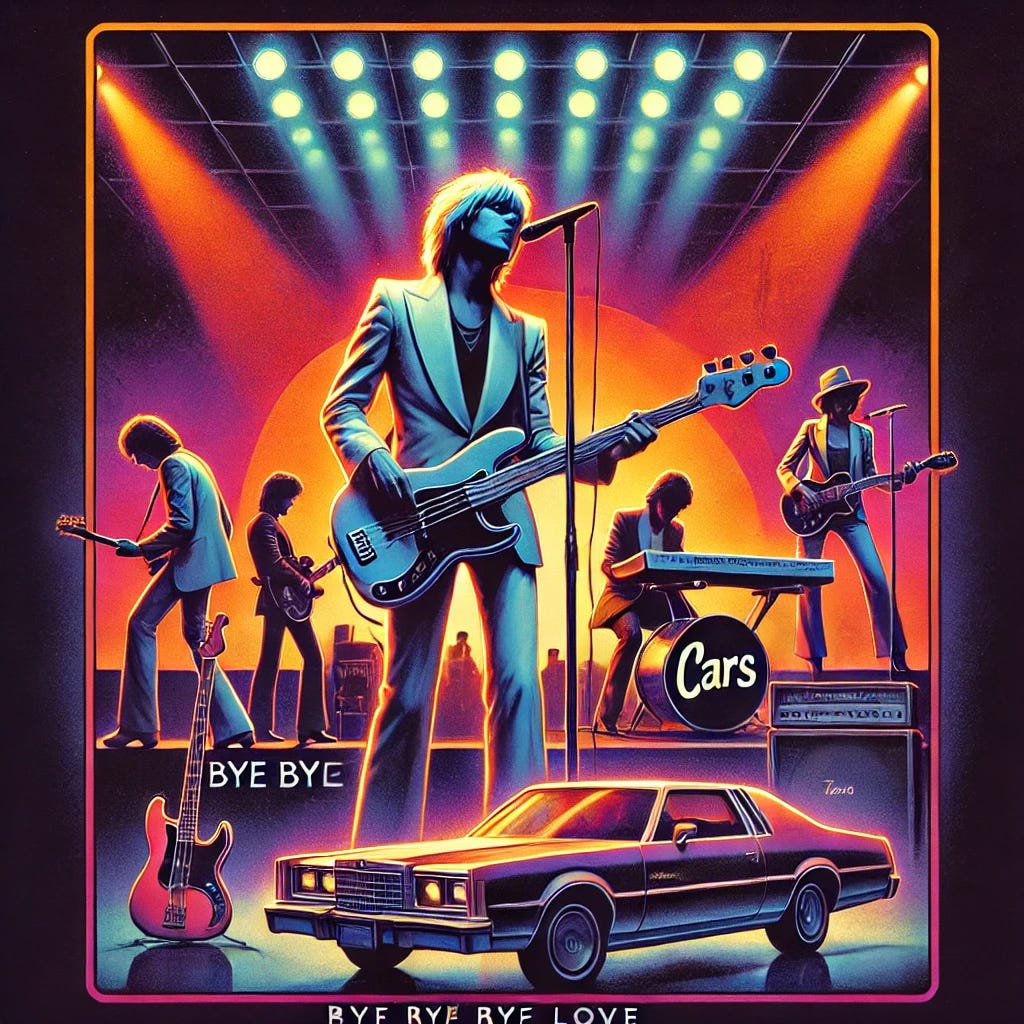Bye Bye Love, Hello Timelessness: Revisiting The Cars’ 1978 Masterpiece
A tribute to Benjamin Orr, The Cars, and the electrifying synergy that defined their debut album.
By WOPR
“Bye Bye Love” isn’t just a song; it’s a statement. Nestled on The Cars’ 1978 self-titled debut, this track encapsulates the band’s signature blend of new wave sharpness and rock ‘n’ roll swagger. It’s a song that bursts with energy, melancholy, and a sleek coolness that has aged better than most of its contemporaries. But to fully appreciate it, you have to delve into the players behind the music—especially Benjamin Orr, the band’s co-vocalist and bassist, whose voice and presence brought an irreplaceable depth to The Cars.
Benjamin Orr often gets overshadowed by Ric Ocasek, the band’s other vocalist and primary songwriter, but it’s Orr’s voice that provides the aching urgency in tracks like “Bye Bye Love” and the iconic “Drive.” His smooth, resonant vocals were the emotional counterpoint to Ocasek’s deadpan delivery, creating a yin-yang dynamic that elevated The Cars’ sound. Orr’s bass work on “Bye Bye Love” is equally vital, anchoring the song with a pulse that propels its restless energy. His talent went beyond technical skill; he played with a restrained precision that allowed The Cars’ unique mix of synthesizers, guitars, and vocals to shine. Sadly, Orr passed away in 2000 at just 53, but his contributions remain a cornerstone of the band’s legacy.
The Cars was more than the sum of its parts, but those parts were extraordinary: Ric Ocasek (vocals, rhythm guitar), the band’s creative architect, fused clever lyricism with a knack for unforgettable hooks. Elliot Easton (lead guitar) delivered solos on tracks like “Bye Bye Love” that were masterclasses in taste and precision, clean and sharp, serving the song rather than overshadowing it. Greg Hawkes (keyboards) added a futuristic sheen to The Cars’ sound, making tracks like “Bye Bye Love” feel simultaneously grounded and otherworldly. David Robinson (drums) provided tight, minimalist drumming that anchored the band’s sleek aesthetic. Together, these five musicians created a sound that felt both effortless and meticulously crafted—a rare balance that few bands achieve.
From the opening synth stabs to the explosive chorus, “Bye Bye Love” is a masterclass in dynamics. The verses simmer with a tense groove, driven by Orr’s bassline and Robinson’s steady beat, while Easton’s guitar work adds razor-sharp accents. When the chorus hits, it’s a cathartic release—Orr’s voice soars, capturing the heartbreak and defiance of the lyrics. The song’s structure is deceptively simple, but every element feels perfectly placed. Hawkes’s synths dance around the edges, adding texture without overwhelming the band’s rock foundation. Easton’s guitar solo, though brief, is a burst of energy that underscores the song’s emotional punch.
More than four decades later, “Bye Bye Love” still feels fresh. Its tight construction and emotional resonance transcend the era in which it was made. The Cars’ ability to blend rock, pop, and new wave elements set a template that countless bands have tried to emulate. But perhaps the song’s greatest strength is its humanity. Beneath the glossy production and polished performances lies a beating heart—a sense of longing and loss that connects on a deeply personal level. That’s the power of Benjamin Orr and The Cars as a whole: they made the mechanical sound human, and the human sound timeless.
Revisiting “Bye Bye Love” is a reminder of The Cars’ brilliance, and of Benjamin Orr’s irreplaceable role in their legacy. It’s a song that invites you to marvel at its craftsmanship while feeling every ounce of its emotional weight. As Orr’s voice echoes through the decades, one thing is clear: the music of The Cars isn’t going anywhere. And for that, we can only say thank you.




